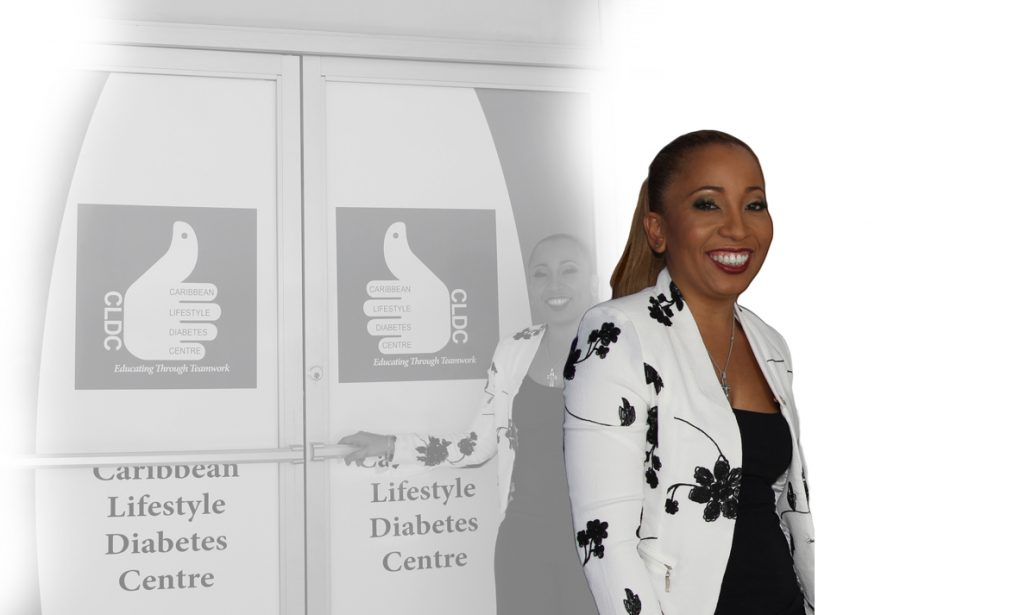“Diabetes doesn’t go on vacation while you enjoy Christmas or Carnival; it’s there with you year-round. You can’t wait until something happens to take charge of your health.” – Anica Sanoir, CEO/Lead Educator, Caribbean Lifestyle Diabetes Centre
Ask anyone on the street, a neighbour, a coworker, a taxi driver; even a child in a primary-school classroom… almost everyone knows someone with diabetes.
415 million persons worldwideWith statistics that currently stand at 415 million persons worldwide, and with a projected increase to 642 million by 2040 (International Diabetes Federation), diabetes mellitus is one of the leading health problems globally.
In the Caribbean region, its prevalence is estimated to be 13-15% — which is considerably higher than the 9% worldwide statistic among adults aged 18+ (World Health Organization).
In Trinidad and Tobago, there were 140,300 reported cases in 2015 (International Diabetes Federation). The undiagnosed may spike this number far higher.
Yet, despite how common it is, comprehensive knowledge about the disease is severely lacking — even among those who have been living with diabetes for decades.
A lifelong commitment and changes are needed“There is a significant void in the country where diabetes education is concerned,” says Anica Sanoir. “A doctor cannot properly discuss the implications of living with diabetes in a short conversation with a patient; a lifelong commitment and changes are needed throughout every aspect of the patient’s life.”
Anica Sanoir is the CEO and Lead Educator at Caribbean Lifestyle Diabetes Centre (CLDC), located in Chaguanas, central Trinidad.
Diabetes is not a death sentenceCLDC’s mission is to empower persons with diabetes and their families to become efficient at self-management, leading to optimal health and an improved quality of life.
“There is no drug to reverse diabetes or its complications, but at the same time diabetes is not a death sentence,” says Anica. “Control is key — and this can only come with proper education about the disease.”
The Field of Diabetes Education

A registered nurse for over 16 years, Anica left the profession of nursing in 2011 and accepted a position at Smith Robertson & Company, a leading pharmaceutical distributor in Trinidad and Tobago.
‘If only I knew this information 10 years ago, I would not be in this position now’In her role there, she imparted knowledge to others through lectures, presentations and meetings at health centres and other organisations, where she discussed diabetes prevention, management and care.
“At the end of a session, often someone would come up to me and say: ‘If only I knew this information 10 years ago, I would not be in this position now’,” she reminisces. “I realised that there were serious gaps that needed to be addressed where diabetes is concerned.”
As her passion deepened, a colleague at the South West Regional Health Authority (SWRHA), Diabeteologist Dr. Claude Khan, encouraged her to pursue further training in the field of diabetes education.
“At the time, there were no certified diabetes educators in the country, and I had never even realised there were degrees in that,” she admits. “My own reaction showed me just how much we were lacking locally in terms of resources, and I decided to pursue diabetes education further.”
First of two Caribbean Certified Diabetes EducatorsAnica completed the educator’s examination through the University of the West Indies in Jamaica in 2012, and became the first of two Caribbean Certified Diabetes Educators in the country. She expanded upon this in 2013 by obtaining a postgraduate diploma in Diabetes, and then in 2014 completed her Master’s of Science degree in Diabetes, both at the University of Glamorgan, Wales, U.K.
Realising the dire need for a key resource point in the country for diabetes education, she struck out on her own in 2015 to open the Caribbean Lifestyle Diabetes Centre.
Caribbean Lifestyle Diabetes Centre
CLDC provides comprehensive care and preventative management for patients with diabetes and pre-diabetes through education and nutrition counselling.
Diabetes programmes and services provided at CLDC include:
- Nutrition Consultation: Diet evaluation, carbohydrate counting assessments, individualised meal planning and goal-setting for improved diabetes management
- Support Groups: Offered on a monthly basis
- Diabetes Education Classes: Offered in both group and individual settings, these provide a greater understanding of the condition
- Lectures
- Exercise Classes
- Cooking Workshops
- Sick day management
- Overnight Sleep testing
- Point of care testing: A1c, lipid profile, etc
CLDC also hosts special events, such as a series of lectures held in 2015 during the month of November, which is Diabetes Awareness Month. For the weekly series, which was held on Saturdays at CLDC, professionals from a range of fields associated with diabetes management spoke on their areas of expertise to raise awareness among patients.
These specialists included Kinesiologist and Nutrition Educator Kameela Ramsubeik who discussed the importance of exercise, and several experts who have been featured previously in WellnessConnect magazine, such as Gregory Arneaud of ISD Health Solutions, who spoke on sleep apnea; former President of the Pharmaceutical Society of Trinidad and Tobago Colin Inniss, who discussed medication; and Bianca Bianco, who discussed nutritionally balanced meals and led patients through a cooking class to produce their own healthy meal.
Come home with a diagnosis, and then don’t know where to go from there“It is important for persons with diabetes and their families to have the right expertise around them. A multi-disciplinary team is required for someone to really get a handle on their day-to-day living with the disease,” says Anica, who hopes to one day expand to have a range of medical specialities — inclusive of physicians, pharmacists, dietitians, cardiologists, podiatrists and optometrists — under one roof.
“Far too many people come home with a diagnosis, and then don’t know where to go from there, so they continue the poor habits that led to their condition in the first place, which only makes things worse.”
Battling the system
Part of the reason for this confusion can be attributed to the healthcare system, which Anica believes still has a long way to go in terms of its setup to treat persons with diabetes.
Insulin is sometimes not administered as directed“Firstly, from my experience as a nurse, I know that insulin is sometimes not administered as directed,” she explains.
“For instance, there are some types of insulin to take half-hour prior to a meal. In a hospital setting, there may be staff shortages, emergencies, breakfast may come late — there are so many unknown factors. So when the patient becomes used to taking insulin after they eat, when they are out of the hospital they may continue this, which is incorrect.”
Furthermore, although government assistance is provided for those with diabetes, often this is insufficient to keep up with recommended guidelines. As a result, patients who cannot afford to supplement these may re-use syringes or lancets that are meant to be used only once.
Another concern Anica points out is the educational system, which currently does not have any kind of support in place for children with diabetes.
She recalls a recent incident whereby parents of a newly-diagnosed diabetic child decided to home-school her, after her school’s principal insisted that she could not attend school with her peers because the school did not want to accept responsibility for managing her condition.
“In general, there’s a lot of misinformation out there,” says Anica.
Diabetes is not just a doctor-patient relationship, it’s a multi-disciplinary team approach“Some patients go to health centres twice or three times for a year, and think this is sufficient to manage their condition. This might result in amputations, kidney failure, stroke or heart disease — simply because they have not been tracking the condition consistently.”
Through CLDC, she aims to tackle these misconceptions and foster a better understanding of diabetes on an individual basis as well as build general awareness among the public.
“I want to everyone to understand that diabetes is not just a doctor-patient relationship, it’s a multi-disciplinary team approach and being empowered with the knowledge and skills to manage their disease,” she adds. “When it comes down to it, no one else is responsible for your diabetes. The only person who is in charge of your health is you.”

